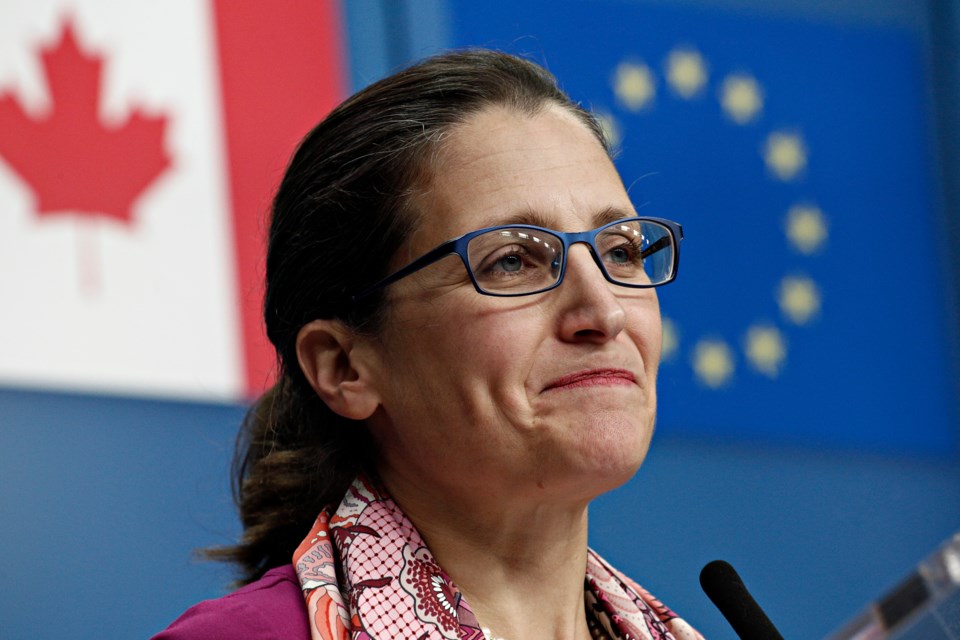It’s a big world out there. One wonders if Prime Minister Justin Trudeau is up to the task of navigating Canada’s place in it.
On CTV’s Question Period, Trudeau hinted his government is looking for a way to end a $15 billion arms deal with Saudi Arabia. An experienced diplomat and our former Ambassador to the Kingdom, Dennis Herak, called this a futile gesture that would, in fact, hurt the Canadian economy.
In the absence of any multilateral economic or military sanctions, the reality of several arms-exporting countries willing to provide weaponized light-armoured vehicles to Saudi Arabia simply makes our gesture a punishment to Canadian workers.
In addition to the loss of several hundred jobs in Ontario, Canada would pay penalties for breaking a legally binding contract with our 17th largest trading partner.
Trudeau and his ministers have formed a habit of not only imposing their own values on all Canadians but also openly criticizing other sovereign states and their governments, damaging Canada’s geo-strategic and economic interests.
What takes our diplomats years, if not decades, to achieve, the Trudeau club can diminish in a single tweet.
In early August 2018, Foreign Affairs Minister Chrystia Freeland tweeted a stinging criticism of the arrest of a human rights activist in Saudi Arabia. While most countries’ foreign officials think diplomacy works better behind closed doors, the Trudeau team prefers to score points at home and late night comedy shows across the U.S. border.
We all support foreign policy based on Canadian values respectful of human rights – but what’s the best way to achieve it? What human rights values are worth more than others?
Only two weeks after Freeland’s tweet – which invited harsh trade and diplomatic reaction – the Saudi air force killed 40 innocent children in a school bus bombing in Yemen. No tweets ensued.
One look at the U.S. State Department’s annual report shows how many regimes commit human rights gross violations. The history of economic, political and arms sanctions shows that the world community has rightly reacted in a collective voice to gross barbaric human rights violations.
In the absence of a multilateral approach, the best strategy has been the politics of engagement. U.S.-China relations are a prime example of how the politics of engagement works better than the politics of confrontation.
Until 1971, the American approach to China was isolationist. It did not recognize China, and as a result, had no influence over its domestic or foreign policy.
A thaw in relations proved that once the politics of engagement started, China came closer to the Western alliance in its Cold War rivalry with the Warsaw Pact. Subsequently, the Chinese leadership allowed the U.S. and other western investment in their country and became close trading partners.
A country’s engagement with other states in the economic and diplomatic spheres, no matter how small or large, makes it more dependent on bilateral and multilateral approaches on a variety of issues.
In other words, trading partners have more influence on each other than those who live in isolation.
Skilled foreign service professionals prevent diplomacy from falling in the zero sum game. It is their skill, acquired through years of experience, that convinces partners, allies and even enemies that diplomacy is a variable sum game that can benefit all sides.
By nature and necessity, most diplomacy is conducted in secret by faceless diplomats. The problem begins with election-ready politicians trying to gain cheap publicity at the expense of years of hard work.
A balanced approach in our trade with all countries will not only benefit our trade-based economy but also enhance our values and beliefs.
Dr. Shinder Purewal is a professor of political science at Kwantlen Polytechnic University, a regular political commentator, and the author of two books, Tandoori Democracy and Sikh Ethnonationalism and the Political Economy of Punjab. He lives in Surrey.



